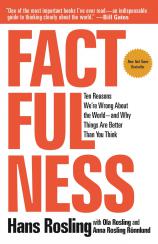Excerpt
Excerpt
Factfulness: Ten Reasons We're Wrong About the World ― and Why Things Are Better Than You Think

The human brain is a product of millions of years of evolution, and we are hard-wired with instincts that helped our ancestors to survive in small groups of hunters and gatherers. Our brains often jump to swift conclusions without much thinking, which used to help us to avoid immediate dangers. We are interested in gossip and dramatic stories, which used to be the only source of news and useful information. We crave sugar and fat, which used to be life-saving sources of energy when food was scarce. We have many instincts that used to be useful thousands of years ago, but we live in a very different world now.
Our cravings for sugar and fat make obesity one of the largest health problems in the world today. We have to teach our children, and our-selves, to stay away from sweets and chips. In the same way, our quick-thinking brains and cravings for drama— our dramatic instincts — are causing misconceptions and an overdramatic worldview.
Don’t misunderstand me. We still need these dramatic instincts to give meaning to our world and get us through the day. If we sifted every input and analyzed every decision rationally, a normal life would be impossible. We should not cut out all sugar and fat, and we should not ask a surgeon to remove the parts of our brain that deal with emotions. But we need to learn to control our drama intake. Un-controlled, our appetite for the dramatic goes too far, prevents us from seeing the world as it is, and leads us terribly astray.
Factfulness and the Fact-Based Worldview
This book is my very last battle in my lifelong mission to fight devastating global ignorance. It is my last attempt to make an impact on the world: to change people’s ways of thinking, calm their irrational fears, and redirect their energies into constructive activities. In my previous battles I armed myself with huge data sets, eye-opening software, an energetic lecturing style, and a Swedish bayonet. It wasn’t enough. But I hope that this book will be.
This is data as you have never known it: it is data as therapy. It is understanding as a source of mental peace. Because the world is not as dramatic as it seems.
Factfulness, like a healthy diet and regular exercise, can and should become part of your daily life. Start to practice it, and you will be able to replace your overdramatic worldview with a worldview based on facts. You will be able to get the world right without learning it by heart. You will make better decisions, stay alert to real dangers and possibilities, and avoid being constantly stressed about the wrong things.
I will teach you how to recognize overdramatic stories and give you some thinking tools to control your dramatic instincts. Then you will be able to shift your misconceptions, develop a fact-based worldview, and beat the chimps every time.
Back to the Circus
I occasionally swallow swords at the end of my lectures to demonstrate in a practical way that the seemingly impossible is possible. Before my circus act, I will have been testing my audience’s factual knowledge about the world. I will have shown them that the world is completely different from what they thought. I will have proven to them that many of the changes they think will never happen have already happened. I will have been struggling to awaken their curiosity about what is possible, which is absolutely different from what they believe, and from what they see in the news every day.
I swallow the sword because I want the audience to realize how wrong their intuitions can be. I want them to realize that what I have shown them — both the sword swallowing and the material about the world that came before it — however much it conflicts with their pre-conceived ideas, however impossible it seems, is true.
I want people, when they realize they have been wrong about the world, to feel not embarrassment, but that childlike sense of won der, inspiration, and curiosity that I remember from the circus, and that I still get every time I discover I have been wrong: “Wow, how is that even possible?”
This is a book about the world and how it really is. It is also a book about you, and why you (and almost every one I have ever met) do not see the world as it really is. It is about what you can do about it, and how this will make you feel more positive, less stressed, and more hopeful as you walk out of the circus tent and back into the world.
So, if you are more interested in being right than in continuing to live in your bubble; if you are willing to change your worldview; if you are ready for critical thinking to replace instinctive reaction; and if you are feeling humble, curious, and ready to be amazed — then please read on.
Excerpted from FACTFULNESS: Ten Reasons We're Wrong About the World — and Why Things Are Better Than You Think by Hans Rosling with Ola Rosling and Anna Rosling Rönnlund. Copyright © 2020 by Hans Rosling, Ola Rosling and Anna Rosling Rönnlund. Reprinted with permission from Flatiron Books. All rights reserved.
Factfulness: Ten Reasons We're Wrong About the World ― and Why Things Are Better Than You Think
- Genres: Nonfiction, Social Sciences
- paperback: 352 pages
- Publisher: Flatiron Books
- ISBN-10: 1250123828
- ISBN-13: 9781250123824



